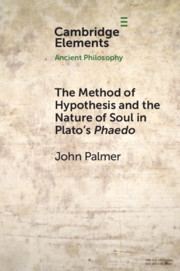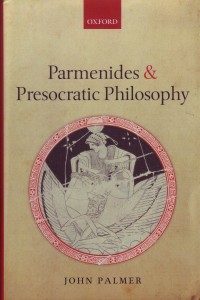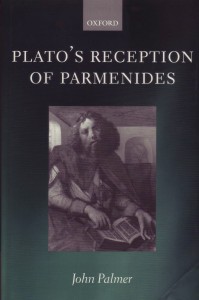BOOKS
Diogenes Laertius: Lives of the Philosophers. Translation with introductory and supporting materials. Under contract with Princeton University Press.
The Method of Hypothesis and the Nature of Soul in Plato’s Phaedo. Elements in Ancient Philosophy. Series editor, James Warren. Cambridge: Cambridge University Press, 2021.
This study of Plato’s Phaedo promotes better understanding of its arguments for the soul’s immortality by showing how Plato intended them, not as proofs, but as properly dialectical arguments functioning in accordance with the method of hypothesis. Unlike the argument for the soul’s immortality in the Phaedrus, which does seem intended as a proof, the Phaedo arguments are proceeding toward the first principles that could serve as the basis for a proof – the most important being an account of the soul’s own essential nature. This study attends to the substantial progress the Phaedo makes toward such an account. It also considers Socrates’ epistemic situation in the dialogue and the problem of whether his confidence in the face of death is misplaced if his arguments have not been proofs before considering how the concluding myth draws together several of the dialogue’s main themes.
Parmenides and Presocratic Philosophy (Oxford and New York: Oxford Univ. Pr., 2009) develops and defends a modal interpretation of Parmenides, according to which he was the first philosopher to distinguish in a rigorous manner the fundamental modalities of necessary being, necessary non-being or impossibility, and non-necessary or contingent being. The book also reconsiders his place in the historical development of Presocratic philosophy in light of this new interpretation. An appendix presents a Greek text of the fragments of Parmenides’ poem with English translation and textual notes.
“One of the most interesting and provocative discussions of the Presocratics, and Parmenides in particular, of the last twenty years.” – James Warren (Cambridge University_
‘Palmer has given us an important new model for the interpretation of Parmenides and Presocratic philosophy. … Everyone interested in ancient Greek philosophy must take account of it.’ – Carl Huffman (DePauw University), Oxford Studies in Ancient Philosophy
Plato’s Reception of Parmenides (Oxford: Clarendon Press, 1999) presents an original account of Plato’s uses and understanding of his most important Presocratic predecessor. It explores the Eleatic underpinnings of central elements in Plato’s middle-period epistemology and metaphysics before showing how in the later dialogues Plato confronts various sophistic appropriations of Parmenides while simultaneously developing his own deepened understanding. The book gives fresh readings of Parmenides’ poem in light of the Platonic reception and discusses Plato’s view of Parmenides’ relation to key figures such as Xenophanes, Zeno, and Gorgias.
“Palmer presents detailed and convincing readings of some of the most difficult passages in the Platonic corpus. … [He] has found a new angle from which to tell the story of the development of the metaphysics of the later dialogues. His analyses of Plato’s arguments are careful and sober, and his tracing of their antecedents in Plato’s reading of Parmenides is innovative and valuable.” – Owen Goldin (), BMCR
SELECT ARTICLES, FORTHCOMING AND RECENT
‘Ethics and Natural Philosophy in Empedocles’. In David Wolfsdorf (ed.), Early Greek Ethics (Oxford: Oxford University Press, 2020): 54-73.
‘Contradiction and Aporia in Early Greek Philosophy’. In V. Politis and G. Karamanolis (eds.), The Aporetic Tradition in Ancient Philosophy (Cambridge: Cambridge University Press, 2018): 9-28.
‘Presocratic Interest in Persistence of the Soul upon Death’. In C. Shields and R. Copenhaver (gen eds.), J. E. Sisko (ed.), History of Philosophy of Mind, vol. 1: Pre-Socratics to Augustine (New York and London: Routledge, 2018): 23-43.
‘Elemental Change in Empedocles’. Rhizōmata: A Journal for Ancient Philosophy and Science vol. 4, no. 1 (2016): 30-54.
‘The Pythagoreans and Plato’. In C. Huffman (ed.), The History of Pythagoreanism (Cambridge University Press, 2014): 204-26.
‘The World of Early Greek Philosophy‘. In F. Sheffield and J. Warren, eds., The Routledge Companion to Ancient Philosophy (Routledge, 2014): 3-17.
‘Revelation and Reason in Kalliopeia’s Address to Empedocles’. Rhizōmata: A Journal for Ancient Philosophy and Science vol. 1, no. 2 (2013): 308-29.
‘Classical Representations and Uses of the Presocratics’. In P. K. Curd and D. Graham, eds., The Oxford Handbook of Presocratic Philosophy (Oxford University Press, 2008): 530-554.
‘Parmenides’. Stanford Encyclopedia of Philosophy. http://plato.stanford.edu/entries/parmenides/ Published 2.8.08.
‘Zeno of Elea’. Stanford Encyclopedia of Philosophy. http://plato.stanford.edu/entries/zeno-elea/ First published 1.9.08. Updated 1.11.12.
‘Melissus and Parmenides’. Oxford Studies in Ancient Philosophy, vol. 26 (2004): 19-54.
‘The New Academy’s Appeals to the Presocratics’. Co-authored with Charles Brittain. Phronesis, vol. 46, no. 1 (2001): 38-72.
‘Skeptical Investigation’. Ancient Philosophy, vol. 20, no. 2 (2000): 351-75.
‘Aristotle on the Ancient Theologians’. Apeiron, vol. 33, no. 3 (2000): 181-205.
‘Xenophanes’ Ouranian God in the Fourth Century’. Oxford Studies in Ancient Philosophy, vol. 16 (1998): 1-32.


